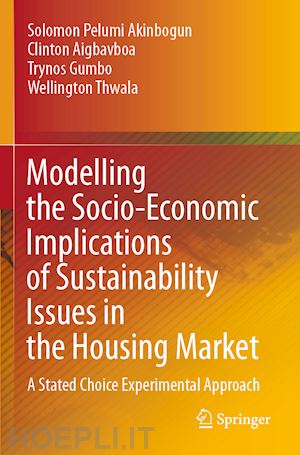
Questo prodotto usufruisce delle SPEDIZIONI GRATIS
selezionando l'opzione Corriere Veloce in fase di ordine.
Pagabile anche con Carta della cultura giovani e del merito, 18App Bonus Cultura e Carta del Docente
This book discusses sustainable housing issues in urban areas throughout the Global South, revealing their complexity in terms of urban dynamics, housing markets and human interactions with the environment. Its main focus is on the location of graves within private residences, cemeteries in the immediate vicinity of private residences, and the implications of these factors for renters’ choices and rents.
The book addresses the economics of land use for graves in connection with housing choices and the implications for the rented sector of the property market. By means of several model-based simulations, it demonstrates that the neoclassical economics remedy to the negative externality of graves in or near private residences remains generally unacceptable.
Providing readers with a clear understanding of tenants’ priorities in their choice of housing, as well as a new approach to the negative externality of graves in the rented sector, the book will be of interest to policymakers, urban planners, investors in residential housing and land economists alike.
Introduction.- Land Use Planning and the Sustainability Challenges.- The Nigerian Property Market Situation.- Negative Externalities and Social Exclusion in the City.- Housing Choice.- Modeling Choices with a Negative Externalities.- The Implication on Tenants’ Choice and Property Market.- Conclusion.
Dr Solomon Pelumi AKINBOGUN is a Postdoctoral Research Fellow at the Department of Construction Management and Quantity Surveying of the University of Johannesburg, Republic of South Africa. He is also an Academic at the Department of Estate Management, School of Environmental Technology, Federal University of Technology, Akure Nigeria. DrAkinbogun obtained his PhD in June 2015 at the Institute for Housing, Urban and Real Estate Research of the School of Energy Geoscience Infrastructure and Society (formerly known as School of Built Environment), Heriot Watt University, Edinburgh United Kingdom. Prior to that, he got his B.Tech (Hons) and M.Tech.Degree in Estate Management from Federal University of Technology Akure Nigeria in Year 2001 and 2007 respectively. His research focus is domiciled in real estate economics and provides a narrative of the implications of externality on housing choice and property values. He has published articles in this regard in several top journals. DrAkinbogun is a reviewer to reputable refereed journals such as International Journal of Housing Market and Analysis, Journal of Facilities Management etc. He is a member of the Royal Institution of Chartered Surveyors (RICS) and the Nigerian Institution for Estate Surveyors and Valuers.
Professor Clinton Aigbavboa, is a Professor of Sustainable Human Settlement at the University of Johannesburg. His research interests are situated in the fields of sustainable human development, with the focus on: sustainable housing regeneration (urban renewal and informal housing), Life Cycle Assessment in the Construction Industry, remanufacturing, leadership in low-income housing, Biomimicry, post occupancy evaluation and green job creation. Before joining academia, he was involved as a quantity surveyor on several infrastructural projects in both Nigeria and South Africa. He completed his PhD in engineering management and has published several research papers in the area of housing, construction and engineering management and research methodology for construction students. He has extensive knowledge in practice, research, training and teaching.
Professor Trynos Gumbo is an Associate Professor of urban sustainability and the Head of the Department of Town and Regional Planning of the University of Johannesburg (UJ). He is a registered professional planner with the South African Council of Planners (SACPLAN) and Zimbabwe Institute of Regional and Urban Planners (ZIRUP), and a corporate member with the South African Planning Institute (SAPI). He joined the UJ in 2014 as a senior lecturer, specifically to spearhead and co-ordinate the development and commencement of an interdisciplinary Masters of Sustainable Urban Planning and Development that involves six faculties of the institution. Professor Gumbo’s research interests include urban sustainability planning and smart cities development and management, spatial policy and design, regional andrural planning, housing and integrated human settlements development, transport infrastructure planning, design and management, renewable energy generation from waste, municipal waste management, application of geographic information systems in solving urban problems, building economics, formal and informal economic planning and development and local economic development.
Professor Wellington Didibhuku Thwala is currently a holder of the SARChi Chair in Sustainable Construction Management and Leadership in the Built Environment. He is a Professor of Construction Project Management and postgraduate programme coordinator at the Department of Construction Management and Quantity Surveying, University of Johannesburg. Professor Thwala has varied research interests, which include project management, engineering design management, economic and social infrastructure delivery, operations and production management and business competitive intelligence.











Il sito utilizza cookie ed altri strumenti di tracciamento che raccolgono informazioni dal dispositivo dell’utente. Oltre ai cookie tecnici ed analitici aggregati, strettamente necessari per il funzionamento di questo sito web, previo consenso dell’utente possono essere installati cookie di profilazione e marketing e cookie dei social media. Cliccando su “Accetto tutti i cookie” saranno attivate tutte le categorie di cookie. Per accettare solo deterninate categorie di cookie, cliccare invece su “Impostazioni cookie”. Chiudendo il banner o continuando a navigare saranno installati solo cookie tecnici. Per maggiori dettagli, consultare la Cookie Policy.